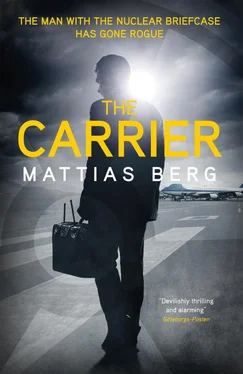Mattias Berg - The Carrier
Здесь есть возможность читать онлайн «Mattias Berg - The Carrier» весь текст электронной книги совершенно бесплатно (целиком полную версию без сокращений). В некоторых случаях можно слушать аудио, скачать через торрент в формате fb2 и присутствует краткое содержание. Город: London, Год выпуска: 2019, ISBN: 2019, Издательство: MacLehose Press, Жанр: Триллер, на английском языке. Описание произведения, (предисловие) а так же отзывы посетителей доступны на портале библиотеки ЛибКат.
- Название:The Carrier
- Автор:
- Издательство:MacLehose Press
- Жанр:
- Год:2019
- Город:London
- ISBN:978-0-85705-788-4
- Рейтинг книги:4 / 5. Голосов: 1
-
Избранное:Добавить в избранное
- Отзывы:
-
Ваша оценка:
- 80
- 1
- 2
- 3
- 4
- 5
The Carrier: краткое содержание, описание и аннотация
Предлагаем к чтению аннотацию, описание, краткое содержание или предисловие (зависит от того, что написал сам автор книги «The Carrier»). Если вы не нашли необходимую информацию о книге — напишите в комментариях, мы постараемся отыскать её.
The Carrier — читать онлайн бесплатно полную книгу (весь текст) целиком
Ниже представлен текст книги, разбитый по страницам. Система сохранения места последней прочитанной страницы, позволяет с удобством читать онлайн бесплатно книгу «The Carrier», без необходимости каждый раз заново искать на чём Вы остановились. Поставьте закладку, и сможете в любой момент перейти на страницу, на которой закончили чтение.
Интервал:
Закладка:
I assumed that Amba probably saw us much as was intended: as criminals of sorts, perhaps spies, maybe even terrorists, with no connection to herself and the children other than that we had now been bundled together in the same room. That she hardly knew who was going to question or be questioned. She would get no further than that now, with so many unknowns. Not even she.
That woman who would otherwise always cut through layer after layer, find the exact deviation from standard pattern in art forgeries, seemed able to uncover everything except my own double life. Whose default setting was bloody-mindedness, especially in her dealings with authorities. Who loved to contest everything, from her perpetual parking tickets to the proposed construction of an activity center at the old playground, which was of some cultural-historical interest. And who had been the one to push for our children’s names.
“Unity” was our first, little more than nine months after we had first met at the welcome party for new teachers at my small Catholic university. Amba was not a member of staff and came along as somebody else’s guest—otherwise the absurd logistics of what I was trying to do would have been impossible: the lies, the excuses, the invented study trips or conferences requiring nights away. Instead, immediately after her exams, she got a job as a forgery expert at the American office of Christies. With Amba’s obvious lack of interest in “talking shop”—because according to her there were so many more important things to talk about—she was also able to accept rapid changes to our plans, without delving too deeply into why. My sudden need at puzzlingly short notice to head out and fetch or drop off something. So long as in return I would cover reasonably often for the unexpected changes in her own schedule. Because some old friend had got in touch, or just her constant overtime at the auction house.
After the invasions of Iraq and Afghanistan, my double life began to be less demanding, since we were no longer involved in what was referred to as “direct warfare”. Instead it became increasingly indirect with each passing year. The state visits shorter, sometimes barely twenty-four hours, in this digital age when our physical presence was no longer such a priority. Edelweiss’ extravagant maneuvers often took place during one single long day, in which the world could just as well succumb to nuclear weapons attacks as be saved at the last moment.
On coming home from those simulations I had thrown myself straight into bed, unable to relate to the real—or unreal—world, had hardly the strength to kiss the children goodnight. For Amba’s benefit I blamed the fact that the students’ constant moral-philosophical paradoxes during our evening seminars had taken it out of me. How they just loved to twist and turn everything, always challenging their poor teacher. In fact I had never had any students. But I knew that Amba would not check that: that she reserved her suspicion, her well-known ability to see through almost everything, for her professional life.
As Amba began to get closer to glancing at my face, circling steadily, as if she were trying to recall something long forgotten, I looked straight at Unity for the first time. She was sitting closest to Amba. Still seemed cheeky, but afraid. Never before had I seen such an expression in her eyes: the very opposite of a spark, something which had gone out forever.
She was unexpectedly pretty, in a red dress that must have been bought after my flight. And even though she was sitting hunched up, resigned but ready to hit back, she looked to have grown at least two inches since I saw the kids for what I thought would be the last time. When on the night of September 4, 2013 I had peered into each of their rooms, held their doors ajar, and whispered a simple “Bye!” at them. Seen Unity lying there covered in sweat, entangled in her sheets, with that strange inner warmth which would not have lessened now with the onset of puberty. I clearly distinguished the drops standing out on her forehead, with the temperature being turned up here in the Interview Room: we had called her the “Steam Engine” when she was really small and the center of attention. During the two years that she was our only child.
Then, suddenly, it all became crystal clear. Why my entire former family was so smartly dressed. And how quickly one can forget the most central of things.
I checked my wrist-watch. The time was 01.14 the night following December 21—the winter solstice as well as Unity’s twelfth birthday. They had been celebrating that evening, in their finery, with the house full of people and only Daddy permanently absent. This is what they had so abruptly been pulled away from. Probably at the exact time when the cake was carried in, given Edelweiss’ unfailing sense of the dramatic.
Once again the memories came welling back, even though they were the last thing I wanted now. The first birthday had been at least as trying as the delivery. Unity had just been given her name, having simply been called “Miracle” during her first year. A group of reasonably intimate friends came to celebrate. Close enough to be invited to our home for the first time, distant enough not to ask any questions which were too difficult. Neighbors, some few chosen colleagues of Amba’s from the auction house, none from my murky existence as a researcher at the university. No family at all, whether mine or Amba’s.
I felt the eyes in the back of my neck, from several of Amba’s female colleagues. I must have puzzled them with my contradictory appearance: the hard-as-steel body and the post in moral philosophy, the lure of my faintly melancholy air. Things which seemed impossible to combine in one and the same person.
When the guests arrived, it felt like the introductory psychological tests I had undergone at West Point’s sealed wing. A glass fell onto the floor, the crash must have been audible all the way out in the dining room, a cloud of small shards, fine splinters. But when I went to clear up there was no longer any trace of the accident. Amba called from the living room, wondered where I had disappeared to, when the drinks would be coming.
Then I saw the glasses. They were on the tray, lined up perfectly as if in an interior design magazine, full to the brim with crushed ice and decorated with garish plastic umbrellas. I put them out on the table and the guests applauded enthusiastically. “What a man,” one of the women said, “might I be allowed to borrow him from time to time?”
The child herself, little Unity as the main character in her party best, the odd little dress which Amba had had made. Neither then nor later did we ever manage to arrange a party for any of our children which actually pleased them. When they were a bit older I tried with treasure hunts. Did my best to pitch them to the lowest possible level, but the games were still far above their heads: with the exception of Duality, the children immediately became whiny and impatient, started to bicker, gripe for ice cream. Then I had to give up organizing them because our friends and neighbors began to talk, the children’s questions spreading to their parents. A father who was a moral philosopher—yet put together such advanced ciphers that not even the grown-ups could work out where the treasure lay buried…
Maybe it had all changed now, even the parties. Since I was no longer there.
Duality was wearing a nice blue suit and seemed as introspective as ever, with that sparkling talent which never quite found its way out. He who was able to solve the simpler cryptic crosswords long before he started school. Was unfailingly the first to find the hiding place during my increasingly complex treasure hunts, before I was forced to stop. Here, today, he was giving nothing away.
Читать дальшеИнтервал:
Закладка:
Похожие книги на «The Carrier»
Представляем Вашему вниманию похожие книги на «The Carrier» списком для выбора. Мы отобрали схожую по названию и смыслу литературу в надежде предоставить читателям больше вариантов отыскать новые, интересные, ещё непрочитанные произведения.
Обсуждение, отзывы о книге «The Carrier» и просто собственные мнения читателей. Оставьте ваши комментарии, напишите, что Вы думаете о произведении, его смысле или главных героях. Укажите что конкретно понравилось, а что нет, и почему Вы так считаете.












